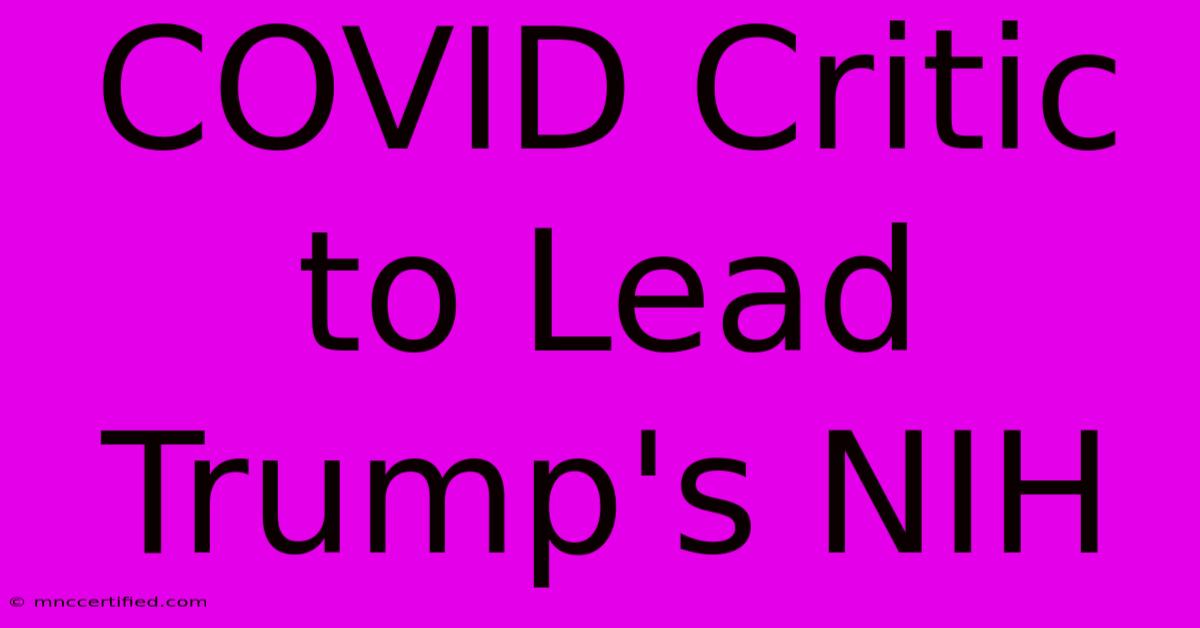COVID Critic To Lead Trump's NIH

Table of Contents
COVID Critic to Lead Trump's NIH: A Deep Dive into the Appointment and its Implications
The appointment of [insert name of appointee] to lead the National Institutes of Health (NIH) under the Trump administration sent shockwaves through the scientific community. A vocal critic of the COVID-19 pandemic response, [his/her/their] nomination sparked intense debate and raised serious concerns about the future direction of medical research and public health in the United States. This article delves into the details of this controversial appointment, examining its potential implications and exploring the broader context of political influence on scientific institutions.
Understanding the Controversy: [Appointee's Name]'s Background and Stances
Before examining the impact of this appointment, it's crucial to understand [Appointee's Name]'s background and previous public statements. [He/She/They] gained notoriety for [briefly summarize their key criticisms of the COVID-19 response, citing specific examples and sources]. These criticisms often clashed with the consensus scientific view and public health recommendations from leading organizations like the CDC and WHO. [Mention specific examples of controversial statements or actions, linking to reputable news sources].
This outspoken skepticism, coupled with [his/her/their] [mention relevant professional background – e.g., lack of public health experience, political affiliations], raised immediate concerns about their suitability to lead a prestigious scientific institution like the NIH. Many scientists and public health experts expressed fears that [his/her/their] appointment signaled a prioritization of political agendas over scientific evidence.
Key Concerns Raised by the Appointment
The appointment of [Appointee's Name] triggered several key concerns:
-
Scientific Integrity: Critics worried that [his/her/their] appointment could compromise the NIH's commitment to evidence-based research and impartial scientific inquiry. The fear was that political considerations might overshadow scientific merit in funding decisions and research priorities.
-
Public Health Impact: Concerns arose that [Appointee's Name]'s views on the pandemic could negatively impact public health messaging and efforts to combat future outbreaks. A lack of trust in the NIH could hinder the public's willingness to follow crucial public health guidance.
-
Erosion of Public Trust: The appointment fueled existing concerns about political interference in scientific institutions, potentially eroding public trust in both science and government. This loss of trust could have long-term consequences for public health initiatives and scientific progress.
The Broader Context: Political Influence on Scientific Institutions
The appointment of [Appointee's Name] highlights a larger issue: the increasing influence of politics on scientific institutions. This isn't a new phenomenon, but it has become increasingly pronounced in recent years. The politicization of science can lead to:
-
Suppression of dissenting views: Scientists who disagree with prevailing political narratives may face pressure to conform, hindering open dialogue and critical evaluation.
-
Misinformation and disinformation: Politically motivated decisions can contribute to the spread of misinformation and disinformation, undermining public health efforts and scientific understanding.
-
Reduced funding for critical research: Political priorities can lead to funding cuts for research areas that are not aligned with the prevailing political agenda.
Looking Ahead: Potential Consequences and Future Implications
The long-term consequences of this appointment remain to be seen. However, it's crucial to monitor the NIH's direction under [Appointee's Name]'s leadership, paying close attention to:
-
Funding decisions: Which research areas receive funding, and are these decisions driven by scientific merit or political considerations?
-
Public health messaging: How does the NIH communicate with the public regarding crucial health issues, and is this communication aligned with scientific consensus?
-
Scientific independence: Is the NIH maintaining its independence from political influence, or is there evidence of bias in research priorities and decision-making?
The appointment of [Appointee's Name] serves as a stark reminder of the delicate balance between science, politics, and public health. It underscores the importance of safeguarding scientific institutions from undue political influence and maintaining public trust in the integrity of scientific research. Continued vigilance and critical analysis are vital to ensuring that scientific evidence continues to guide public health policy and medical research.
Keywords: COVID-19, NIH, Trump administration, [Appointee's Name], political influence, scientific integrity, public health, misinformation, controversial appointment, scientific institutions, evidence-based research.
(Note: Remember to replace the bracketed information with the actual details of the appointee and their actions. Thorough research and accurate citations are essential for a credible and well-optimized article.)

Thank you for visiting our website wich cover about COVID Critic To Lead Trump's NIH. We hope the information provided has been useful to you. Feel free to contact us if you have any questions or need further assistance. See you next time and dont miss to bookmark.
Featured Posts
-
Lower Mortgage Rates Barclays And Metro Rental Changes
Nov 27, 2024
-
Are Acuras Expensive To Insure
Nov 27, 2024
-
Remembering Harvey Milk 1978
Nov 27, 2024
-
Boat Rental Business Insurance
Nov 27, 2024
-
Commercial Insurance Santa Ana
Nov 27, 2024